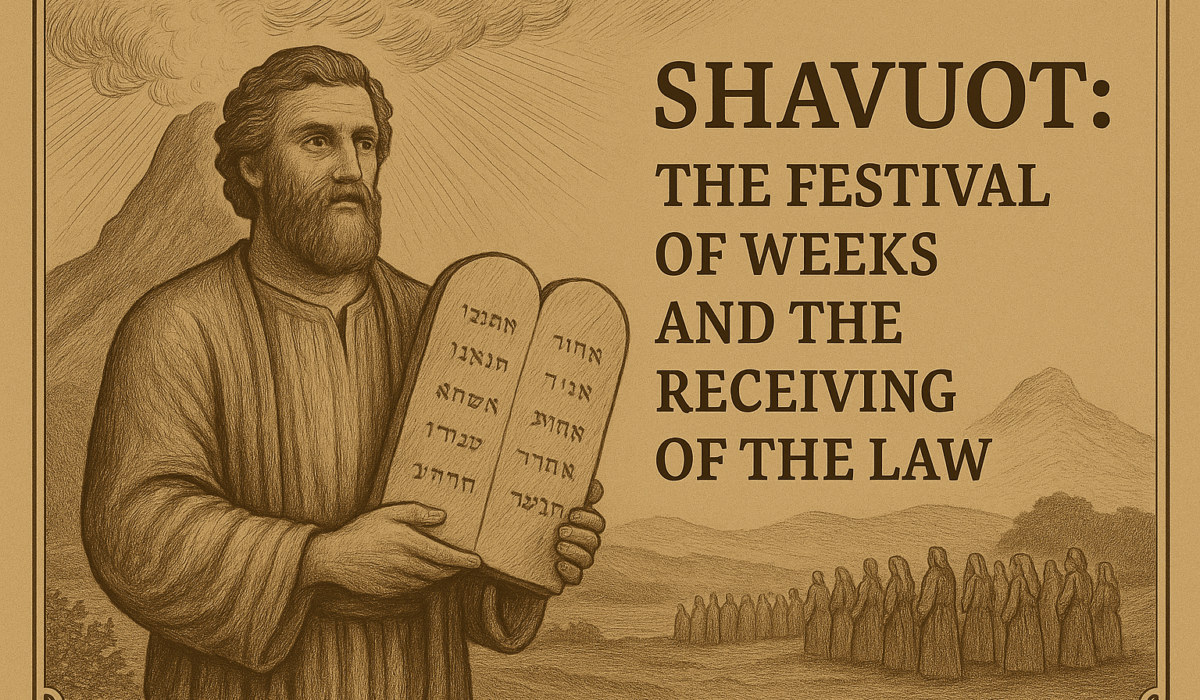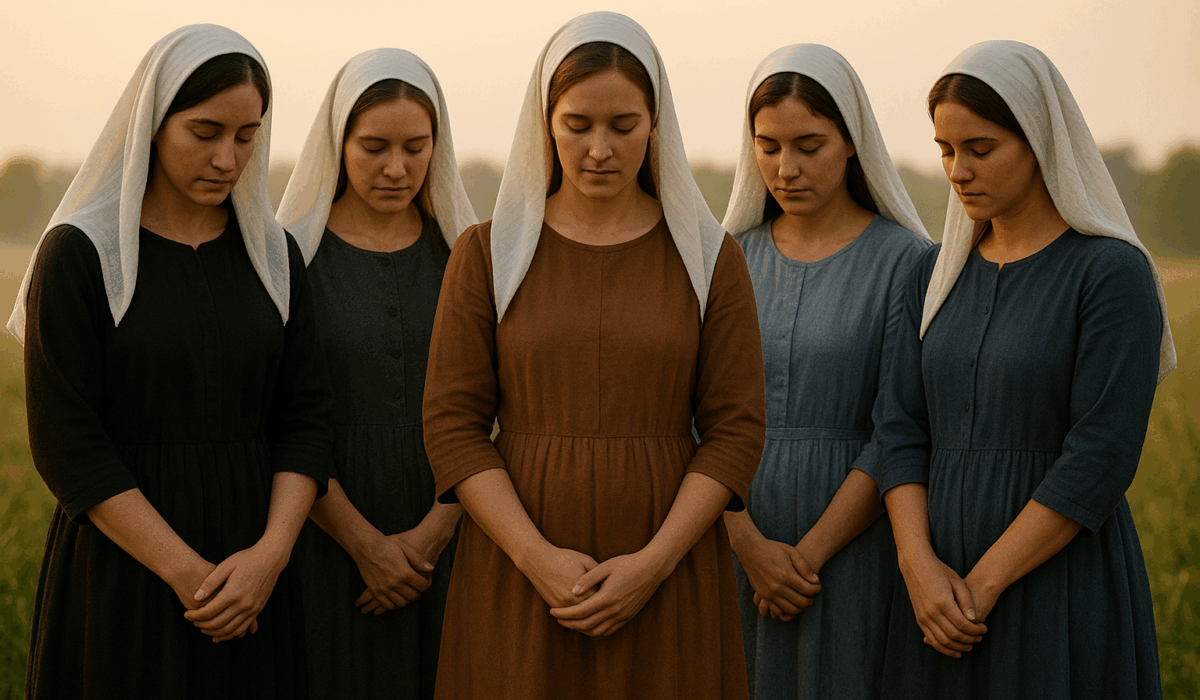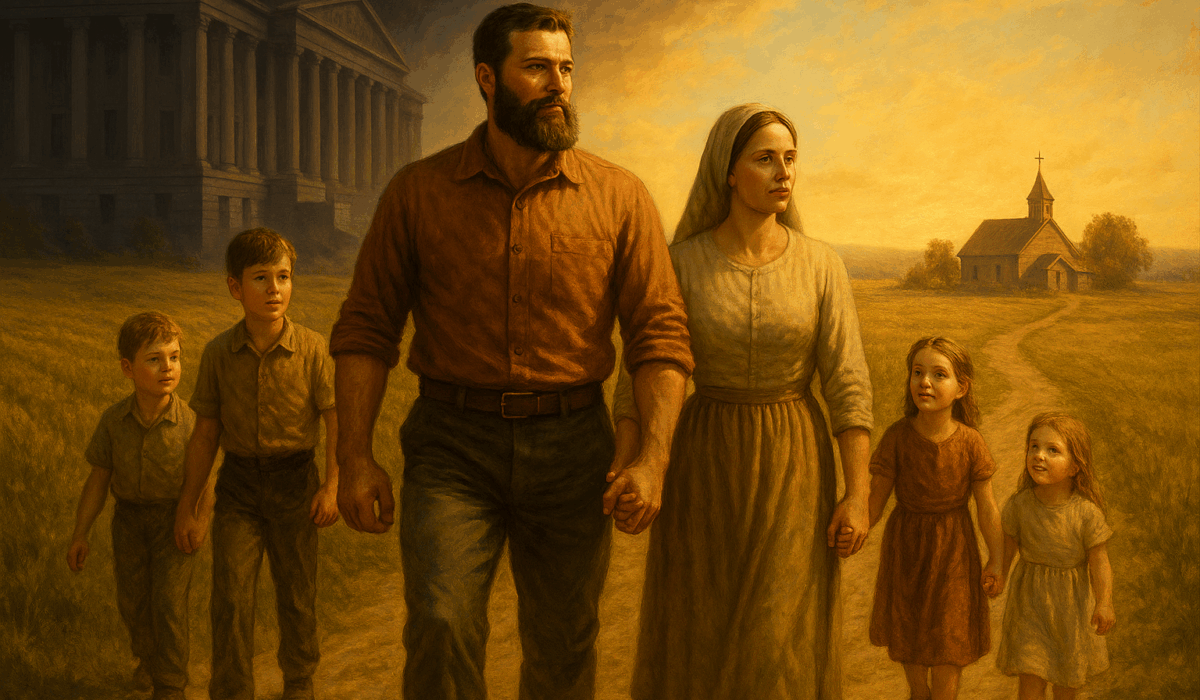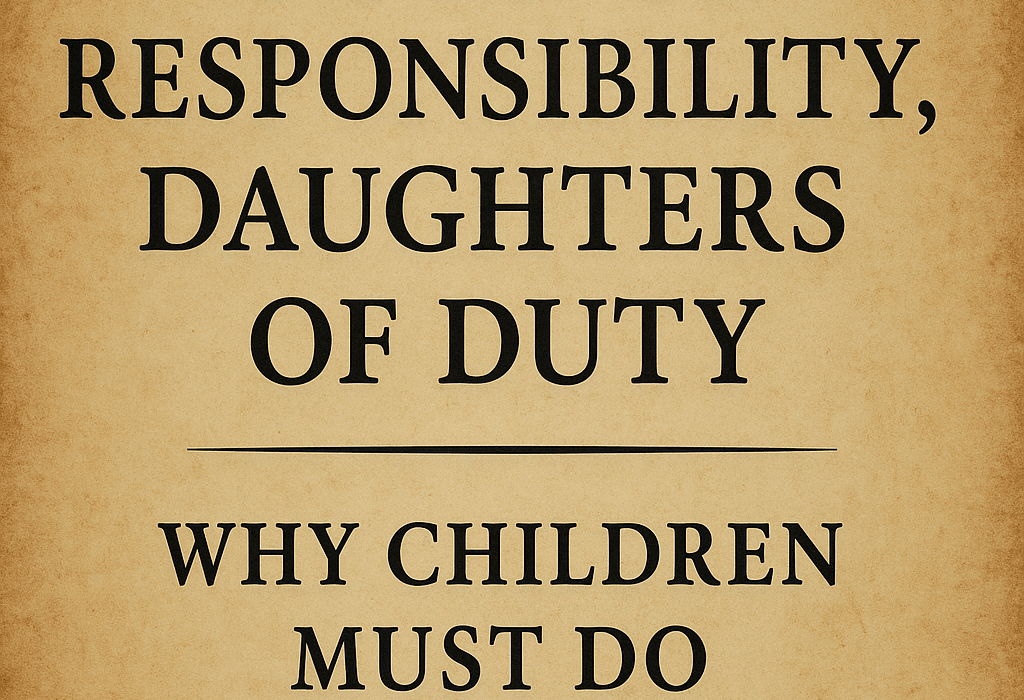A Call to Return to the Mount of Covenant
“And ye shall count unto you from the morrow after the sabbath… even unto the morrow after the seventh sabbath shall ye number fifty days; and ye shall offer a new meat offering unto the Lord.”
— Leviticus 23:15–16 (KJV)
Part I: Returning to Sinai — Rediscovering the Forgotten Feast
Among the appointed times of the Lord, Shavuot, or the Feast of Weeks, stands as a monumental pillar in the divine calendar. It is not merely a commemoration; it is a covenantal summons. A time to remember not only what was given, but to renew what is demanded. Most know it vaguely as the day of Pentecost. Fewer still know its Hebrew origin. And even fewer live as though its significance has never waned. Yet the God of Abraham, Isaac, and Jacob has not changed, and neither have His expectations.
Shavuot is the celebration of the giving of the Law; the Torah, on Mount Sinai. It is the marriage of YHWH and His people. It is the moment when slaves became a nation, when chaos became order, when freedom became responsibility. Shavuot is the mountain of fire, of thunder, of commandments etched by the very finger of God. It is, in truth, one of the holiest days in the Biblical calendar.
And yet, how many Christians today, who claim to love God with all their heart, have no idea what Shavuot even is?
In a world ruled by commercial holidays, pagan customs dressed in tinsel and eggshells, and empty pews echoing with powerless songs, it is time for the people of God to rise and remember. To honor what He has called “My feasts” (Leviticus 23:2). These are not “Jewish holidays.” They are YHWH’s appointed times. We are called to follow His calendar, covenants, and commandments.
Shavuot is not optional. It is an anchor. A flame. A banner of the covenant.
Let us ascend the mountain once more.
Part II: The Biblical Foundation of Shavuot
Commanded by God
The Feast of Weeks is first commanded in the Torah, appearing in multiple places with specific instructions:
“And thou shalt observe the feast of weeks, of the firstfruits of wheat harvest, and the feast of ingathering at the year’s end.”
— Exodus 34:22
“Seven weeks shalt thou number unto thee: begin to number the seven weeks from such time as thou beginnest to put the sickle to the corn: And thou shalt keep the feast of weeks unto the Lord thy God with a tribute of a freewill offering of thine hand…”
— Deuteronomy 16:9–10
These instructions are not vague or symbolic. They are specific and agricultural. From the first Sabbath after Passover, count seven Sabbaths (49 days), and on the next day, the 50th, Shavuot is to be observed. It is the capstone of the spring feasts, the conclusion of the “counting of the Omer,” and the revelation of law after the redemption of blood.
Shavuot follows Passover for a reason: deliverance comes first, then instruction. Freedom is not lawlessness, but rather a transfer of allegiance from Pharaoh to God. The redeemed must be ruled, or they will return to bondage. Shavuot is when that rule was given.
The Giving of the Torah
Shavuot marks the day when God descended upon Mount Sinai in fire and declared His holy law to His chosen nation:
“And it came to pass on the third day in the morning, that there were thunders and lightnings… and mount Sinai was altogether on a smoke, because the Lord descended upon it in fire… and the voice of the trumpet waxed louder and louder…”
— Exodus 19:16–19
This was not a private vision. It was not a whisper in the ear of Moses alone. It was a national event, an audible revelation. The only time in history when an entire nation heard the voice of God together and lived.
“And he declared unto you his covenant, which he commanded you to perform, even ten commandments; and he wrote them upon two tables of stone.”
— Deuteronomy 4:13
This covenant was not ceremonial. It was moral, eternal, and binding. It defined the nature of righteousness. It codified the law of heaven for earth. It was, and remains; the standard by which nations rise or fall.
Shavuot is the remembering of this giving. It is the renewing of this covenant. And it is a call to keep it.
Law vs. Ceremonial: What Still Applies?
One of the common errors of modern Christianity is to divide God’s law into neat little dispensational boxes and declare whole swaths of Scripture irrelevant. “We’re not under the law,” they say, confusing Paul’s rebuke of justification by the law with the abolition of the law itself.
But Scripture never abolishes the law of God. Rather, it reaffirms it repeatedly:
“Do we then make void the law through faith? God forbid: yea, we establish the law.”
— Romans 3:31
“For this is the love of God, that we keep his commandments: and his commandments are not grievous.”
— 1 John 5:3
There is a distinction, however, between the ceremonial law, such as animal sacrifices, temple rituals, and priestly garments; and the moral and civil law of the covenant. The ceremonial law pointed to the Messiah and was fulfilled in Him. But the commandments given at Sinai, the Ten Commandments and the statutes which interpret and expand them, are eternal.
Shavuot is not a ceremonial shadow. It is not a dead tradition. It is a commanded celebration of the giving of God’s eternal instruction for life. As long as we still need instruction, as long as sin and righteousness exist, then so too does the need for the law. And the day that commemorates its giving is not obsolete, but essential.
Part III: Shavuot in the New Testament – Pentecost and the Spirit of the Law
Shavuot was not abolished by the New Covenant. It was fulfilled in a deeper way, by the Spirit writing the law upon the hearts of the believers.
“And when the day of Pentecost was fully come, they were all with one accord in one place.”
— Acts 2:1
The word “Pentecost” simply means “fiftieth.” It is the Greek name for Shavuot, celebrated by faithful Jews all over the Roman Empire. On that very day, the day commemorating the giving of the Torah, the Holy Spirit was poured out, and the Law was written upon hearts instead of just stone.
“But this shall be the covenant that I will make with the house of Israel… I will put my law in their inward parts, and write it in their hearts…”
— Jeremiah 31:33
“A new heart also will I give you… and cause you to walk in my statutes, and ye shall keep my judgments, and do them.”
— Ezekiel 36:26–27
Pentecost was not the rejection of the law. It was the internalization of it. The Spirit did not replace the Torah, the Spirit enabled obedience to it.
Thus, Shavuot is both Old and New Covenant. It is the day the Law was given externally, and the day it began to be written internally. It is the marriage of Word and Spirit, and it is as relevant now as it was on the heights of Sinai.
Part IV: The Symbolism of the Offering — Two Loaves and the Firstfruits
“Ye shall bring out of your habitations two wave loaves of two tenth deals: they shall be of fine flour; they shall be baken with leaven; they are the firstfruits unto the Lord.”
— Leviticus 23:17
The most peculiar offering required for Shavuot is not without meaning. The two loaves of leavened bread offered during this feast represent a profound spiritual truth, one often overlooked by the modern reader.
In contrast to the Feast of Unleavened Bread, during which all leaven (a symbol of sin) was to be purged, here we find an offering with leaven. Two loaves, both waved before the Lord, consecrated as firstfruits. What does this mean?
These loaves symbolize the two houses, Judah and Ephraim, both offered, both sinful, yet both made acceptable through the sanctifying work of God. They represent the beginning of a harvest, not the fullness of it. The loaves are not perfect, but they are set apart. This is not the end, but the start.
The presence of leaven in the offering reminds us that we are a work in progress. We are not yet glorified, yet we are still presented before God as part of His redemptive harvest. Just as the giving of the Law marked the birth of Israel as a nation, so the outpouring of the Spirit at Pentecost (Shavuot) marked the birth of the Church, both houses united in faith under one King, Messiah Yahusha (Jesus).
The Shavuot offering, therefore, is more than agricultural, it is covenantal. It is not just about wheat and flour, but about people and promise. God is building a kingdom, and the firstfruits are only the beginning.
Part V: Shavuot as a Covenant Marriage Between YHWH and Israel
One of the most powerful themes of Shavuot is that of marriage. Sinai was not just the place where God gave laws. It was the place where He entered into covenant with His people. It was, in effect, a wedding ceremony between YHWH and his people Israel.
“Now therefore, if ye will obey my voice indeed, and keep my covenant, then ye shall be a peculiar treasure unto me above all people…”
— Exodus 19:5
“And all the people answered together, and said, All that the Lord hath spoken we will do.”
— Exodus 19:8
These words mirror the ancient structure of a betrothal agreement. God declared His intentions, His requirements, and His blessings. The people agreed to the terms. Blood was shed (Exodus 24:8). A meal was eaten (Exodus 24:11). The covenant was sealed.
Jeremiah later confirms this relationship:
“Turn, O backsliding children, saith the Lord; for I am married unto you…”
— Jeremiah 3:14
This covenant-marriage is renewed in the New Covenant as well, not abolished, but extended. In Ephesians 5, Paul reveals that the marriage between Christ and the Church mirrors the relationship between YHWH and Israel. Christ is the Husband, the Head, the Giver of the Word. The Church is the wife, the helpmeet, the one who submits to and keeps the commandments.
Shavuot, then, is not just the giving of law. It is the sealing of a relationship. It is the declaration of headship and submission, of order and obedience. It is the formalization of divine dominion over a people. Just as marriage is the foundation of the household, Shavuot is the foundation of the covenant household of God.
If we do not honor the anniversary of this marriage, then we are like a bride who forgets her wedding day. We forget the vows, the covenant, and we forget the law.
Let us remember!
Part VI: Modern Applications — Why and How We Keep Shavuot Today
Some will ask, “How can we keep Shavuot today? We have no temple. We cannot offer sacrifices. Is this feast even possible?”
The answer is yes, resoundingly so. Shavuot, like all the appointed times, was never only about ritual. It was always about remembrance, renewal, obedience, and rejoicing. While the ceremonial aspects (such as the animal sacrifices and priestly rites) are fulfilled in Christ, the moral and covenantal aspects endure.
Here is how we apply Shavuot today in the context of The Great Order—restoring the Biblical household under divine law:
1. Counting the Omer
Begin by counting the days from the Sabbath after Passover until the fiftieth day. This counting is a spiritual discipline. It builds anticipation. It reminds us that God’s law does not arrive instantly but is sought after diligently.
“Blessed are they that keep his testimonies, and that seek him with the whole heart.” — Psalm 119:2
2. Teach the Law
Shavuot is the season to recommit to God’s commandments. Fathers should gather their households and teach the Ten Commandments afresh. Read Exodus 19–20, Deuteronomy 5–6, and Psalm 119. Instruct sons. Encourage daughters. Review household laws. Reaffirm family order. Let this day renew the household covenant.
3. Gather as Households and Tribes
Though scattered, we are still a people. Gather with fellow believers. If there is no local assembly walking in truth, gather your household alone, but do not neglect the assembly if it exists. Break bread. Pray. Read Scripture. Rejoice.
4. Feast with Rejoicing
Shavuot is a feast! Prepare food. Bake bread. Roast meat. Drink wine. It is a day of covenant joy. Sing songs of praise. Honor the Lawgiver.
“Thou shalt keep the feast of weeks… and thou shalt rejoice before the Lord thy God, thou, and thy son, and thy daughter…”
— Deuteronomy 16:10–11
5. Wave Loaves of Bread
While we no longer present offerings in the temple, we may still wave two loaves before the Lord as a symbolic remembrance. Let the household head present them as a sign of dedication: “We are Yours, O Lord. Accept us as firstfruits.”
6. Celebrate Firstfruits
Give a special offering of the household increase, whether money, grain, garden produce, or goods. Set it aside for the work of the Kingdom. Shavuot is about the beginning of increase.
7. Renew the Marriage Covenant
Let married couples renew their covenant before God. Just as Shavuot celebrates the covenant marriage between God and Israel, so too should earthly marriages be renewed. Men, declare your covering and duty to lead. Wives, declare your submission and support. Teach the children by example.
Part VII: Celebration Ideas for the Household
Here are practical and joyful ways to celebrate Shavuot in your household and community:
- Decorate with Wheat and Harvest Symbols: Use sheaves, grain, and firstfruits as visual reminders.
- Create a Family Torah Scroll: Have the children help write or illustrate the Ten Commandments.
- Host a Torah Reading Night: Invite other families for a public reading of Exodus 20 and Deuteronomy 6.
- Prepare a Covenant Feast: Include dairy dishes (a Jewish tradition representing “milk and honey”), meat, and fresh bread.
- Hold a Firelighting Ceremony: Remember the fire of Mount Sinai by lighting candles or a bonfire at sunset.
- Scripture Memory Challenge: Teach children to memorize the Ten Commandments.
- Tell the Story of Pentecost: Read Acts 2 and discuss the giving of the Spirit and its connection to the Law.
- Symbolic Loaf Presentation: Present two loaves of leavened bread as a household offering to the Lord.
These celebrations are not merely cultural. They are covenantal. They are how we shape a family that walks in divine order. A family that remembers, and obeys.
Part VIII: Shavuot and the Restoration of Dominion
The modern church, having divorced herself from the law of her Husband, wanders in the wilderness without compass or covenant. She has forgotten Sinai. She has despised Torah, and sings of freedom but recoils from responsibility. She waves banners of grace but spits on the very foundation of that grace, the law that defines sin (Romans 7:7) and righteousness (Deuteronomy 6:25).
Shavuot is the antidote to this amnesia. It is the flame that lights the way back to dominion.
The Law and Dominion
Adam was given dominion, but without law, dominion becomes tyranny. It becomes chaos. The law of God is the blueprint for holy dominion. It is the constitution of heaven, meant to be enacted upon the earth. A man cannot rule his house rightly apart from the statutes of YHWH. A nation cannot prosper apart from the commandments of God.
“And it shall be our righteousness, if we observe to do all these commandments before the Lord our God, as he hath commanded us.”
— Deuteronomy 6:25
“Blessed is the nation whose God is the Lord; and the people whom he hath chosen for his own inheritance.”
— Psalm 33:12
When we keep Shavuot, we are declaring our allegiance not to man-made constitutions, but to the unchanging Word of the King of kings. We are not merely remembering history, we are aligning with His hierarchy, His headship, and His order.
A man who celebrates Shavuot as the receiving of divine law is a man who declares war against humanism, feminism, statism, and relativism. He is a man who says, “As for me and my house, we will serve the LORD” (Joshua 24:15).
This is the kind of man that builds The Great Order.
Shavuot and the National Identity of Israel
Let us speak plainly. The modern church has embraced a globalist lie. She sees herself as disconnected from Israel, despite Paul’s clear teaching that we are grafted into the olive tree (Romans 11), and heirs of the covenants (Ephesians 2:12–13). Shavuot is the perfect litmus test. If a man rejects it, he rejects the covenant that birthed the nation of Israel. He rejects the moment God said, “I take you as My people, and I will be your God” (Exodus 6:7; cf. Exodus 19:5–6).
To restore our people, our households, our dominion, we must reclaim our identity. We are not Greeks, nor Romans, and we are not secular Americans. We are the people of God, a holy nation, we are Israel and subject to her King.
And the King gave us a law.
Shavuot is not just a feast day. It is Independence Day for the righteous. It is Constitution Day for the Kingdom of Heaven on earth. It is the covenant day for the nation under God.
If we want to see restoration; true, lasting, generational restoration, we must begin where the ancient nation began: at the foot of the mountain, where fire met stone, and stone met flesh, and covenant met blood.
A Vision for the Future: Shavuot in a Righteous Nation
Let us imagine it, Lord Redbeard. Let us see it.
A land where every household marks the days from Passover to Pentecost, not with pagan eggs or chocolate bunnies, but with sacred reverence. Where fathers teach their children to count each day in anticipation of the giving of the Law. Where, on the fiftieth day, thousands of Christian families, Bibles in hand, bread loaves on their tables, gather in fields and sanctuaries to hear the Ten Commandments read aloud once more.
A nation where lawmakers write legislation informed by the Law of Moses, not by the whims of degenerates or the trends of democracy. Where education begins with the fear of God. Where national leaders swear fealty not to the Constitution of 1787, but to the unchanging law of the Almighty God.
Where Pentecost is not a day for shouting and falling over, but a day for law and order, for discipline and dominion, for righteous covenantal hierarchy restored.
In this nation, this restored Israel, the household becomes the first government. The father becomes the first lawgiver. The mother, the first teacher, and the family feasts not in idleness, but in thanksgiving for the law that makes freedom possible.
This is what Shavuot demands. And this is what it empowers.
Part IX: Let the Patriarchs Rise at Shavuot
Men of God, this is your charge. Return to the mountain, climb it, take your wife and children with you. Read the commandments aloud in your house. Teach your sons to wield them like swords. Train your daughters to love them like jewels. Let the law be upon your doorposts, your gates, your hearts, your lips.
Shavuot is not for the weak, but for the righteous. It is not for the rebellious, but for the obedient. It is not for the lawless, but for the kingdom-builders, the patriarchs, the priest-kings who govern in the fear of YHWH.
Let this feast be a line in the sand. Let it be the turning point for your household. Let it be the day you stop making excuses and start making disciples. Let it be the moment you bind the commandments to your hands and head (Deuteronomy 6:8), and build your domain on the rock of the Word.
Do not let Shavuot pass like another day, It is not tradition. It is a holy convocation, commanded by the living God, not optional, not spiritualized, not canceled by grace.
You were not saved from Egypt to wander. You were saved to rule!
Final Word: Shavuot is Our Standard
“The law of the Lord is perfect, converting the soul: the testimony of the Lord is sure, making wise the simple.”
— Psalm 19:7
“Where there is no vision, the people perish: but he that keepeth the law, happy is he.”
— Proverbs 29:18
The Great Order will not come through politics alone. It will not come through slogans or movements. It will come through households returning to Sinai. It will come through men who reclaim the law, teach it, live it, and celebrate it.
Shavuot is that opportunity. Once a year, every year, God gives us this reminder: I redeemed you by blood (Passover), now serve Me by law (Shavuot). It is the foundation of covenant life.
Celebrate it. Teach it. Build upon it.
Let the fire of Sinai burn in your bones. Let the commandments thunder from your tongue. Let the Spirit write the law upon your heart.
And let every household in your domain say:
“All that the Lord hath spoken we will do.”
Shavuot Celebration Summary for Patriarchs:
- Date: The day after the 7th Sabbath following Passover (the 50th day)
- Focus: The giving of the Law at Mount Sinai
- Scriptures to Read: Exodus 19–20, Deuteronomy 5–6, Acts 2, Jeremiah 31
- Symbols: Two leavened loaves, wheat, fire, stone tablets
- Practices:
- Count the Omer with the household
- Teach and read the Ten Commandments
- Prepare a covenant feast
- Wave two loaves before the Lord
- Give a firstfruits offering
- Renew marriage and household covenants
- Rejoice with song, Scripture, food, and family
- Count the Omer with the household
- Spiritual Application: Renew your household’s covenant with YHWH; receive again the Law; walk in dominion
- Household Theme: “We are the firstfruits of His increase” (Jeremiah 2:3)
Let The Great Order rise again!









